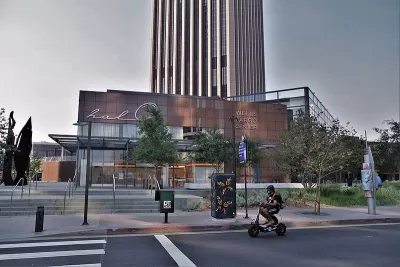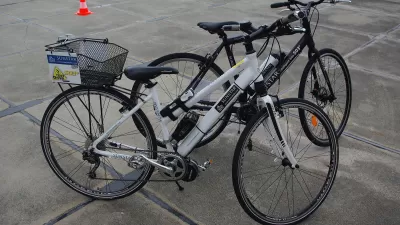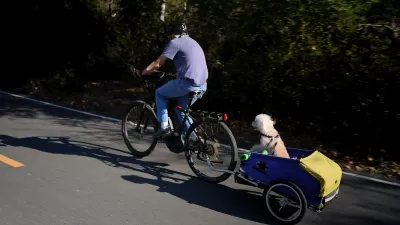As more people buy e-bikes for regular commuting and transportation, cycling advocates are calling for cities to beef up investment in safe infrastructure.

In the United Kingdom, "e-bike sales outstripped electric car sales in 2020," with one e-bike selling every three minutes. Yet, writes Lloyd Alter, "guess which mode of transport gets all the attention and the infrastructure investment, with the government spending another 20 million pounds ($27.75 million) on charging points that they often stick in the middle of sidewalks?"
Mark Sutton, editor of Cycling Industry News, cites a "lack of safe infrastructure" as "the biggest obstacle to growing cycling levels," calling for U.K. cities to step up investment in infrastructure and safety for cyclists. "For a true end-to-end journey to become viable by bike things like cycle parking must be factored in, employers will have to begin to cater and even incentivise non-car travel (property with showers and cycle-friendly access are now worth more) and residential areas will have to be linked to arteries. People won’t take that first step if the view outside their door is terrifying."
The bike boom is also gaining support from an unlikely ally: real estate developers. Alter describes Sutton's theory: "Developers want to build more, but they know that there isn't room for a lot more cars, which 'spill out of our own individual spaces and on to public land, where in theory they have no real right to be.'"
In the U.S., e-bike sales also jumped by 145% over 2019, while electric car sales dropped slightly, but the federal government's infrastructure plan only allocates $20 billion for road safety programs that benefit cyclists and pedestrians, compared with $174 billion for vehicle electrification. Critics worry that "funneling billions into vehicle electrification will continue to prop up our car-centric transportation system and enrich car companies instead of challenging car dominance with investments that reduce the need for cars." As Alter writes, "we shouldn't lose sight of the fact that there is a serious e-bike boom happening right now, or that we can't keep expanding our cities horizontally and vertically without reducing the proportion of people who drive cars, electric or gas—there simply isn't enough room."
FULL STORY: The E-Bike Spike Continues With 1 Selling Every 3 Minutes

Planetizen Federal Action Tracker
A weekly monitor of how Trump’s orders and actions are impacting planners and planning in America.

Map: Where Senate Republicans Want to Sell Your Public Lands
For public land advocates, the Senate Republicans’ proposal to sell millions of acres of public land in the West is “the biggest fight of their careers.”

Restaurant Patios Were a Pandemic Win — Why Were They so Hard to Keep?
Social distancing requirements and changes in travel patterns prompted cities to pilot new uses for street and sidewalk space. Then it got complicated.

California Homeless Arrests, Citations Spike After Ruling
An investigation reveals that anti-homeless actions increased up to 500% after Grants Pass v. Johnson — even in cities claiming no policy change.

Albuquerque Route 66 Motels Become Affordable Housing
A $4 million city fund is incentivizing developers to breathe new life into derelict midcentury motels.

DC Area County Eliminates Bus Fares
Montgomery County joins a growing trend of making transit free.
Urban Design for Planners 1: Software Tools
This six-course series explores essential urban design concepts using open source software and equips planners with the tools they need to participate fully in the urban design process.
Planning for Universal Design
Learn the tools for implementing Universal Design in planning regulations.
Heyer Gruel & Associates PA
JM Goldson LLC
Custer County Colorado
City of Camden Redevelopment Agency
City of Astoria
Transportation Research & Education Center (TREC) at Portland State University
Camden Redevelopment Agency
City of Claremont
Municipality of Princeton (NJ)





























